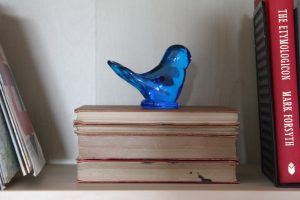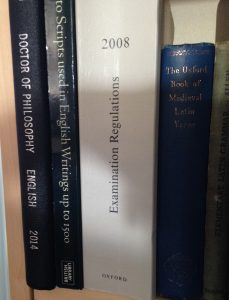I finished yesterday’s post undecided about my academic books. Today, it’s time to tell how I dealtwith them.
The problem, for me, with my academic books, is that they embody every type of value that Kondo describes: functional (I can use them), informational (they contain knowledge), emotional (I’m sentimental about them), and rarity (they are often hard to replace). I have actually dithered for years about my book collection and whether I could ever pare it down without losing a piece of my soul.
So let’s dig into this.
First of all, there are some of my academic books that I felt ‘meh’ about. These were mainly teaching copies of texts that I used because I had to, not because I loved the text or it was the authoritative edition. I hesitated momentarily, thinking, ‘What if I have to teach this again?’ But, you know, I am not so awesome that I could pick up my copy and teach it ex tempore without reading the book again. Nor are my notes so awesome that they would replace actual lesson planning. So if I have to teach it again, I’ll start from scratch.
Then there are the books I haven’t yet read. Not many, but a few copies I picked up here and there of some non-English medieval romances, and some critical theory, the kind of thing I didn’t have time to read during my PhD but that is peripherally relevant to my interests. These were an example of books inspiring ‘joyful thoughts’, if not joy itself. I love to think of the day when I finally have time and energy to feel inspired…pick up a volume of Paul Ricoeur…and feel the hard-earned, mind-blowing pleasure of trying to understand him. In the end I kept these books, and put them in a section together of unread items, about five in number. It gives me joy that my academic book collection – in many ways a testament to past glories rather than present purposes – still contains a few unexplored corners. It’s nice to be able to glimpse things beyond the immediate horizon.
I did, in the end, discard some miscellaneous academic books: a volume of essays that I read but, having used them in my thesis, felt ‘finished’ with them; an old edition of Chaucer; some philosophy books; a few random things. This was hard.
I’ve realised that, especially since finishing my PhD, I tend to see my books as my only tangible link to that part of me, especially now that we’ve moved and the possibility of visiting my old haunts is gone. My books are also the only things (so I think to myself) in our home that would give anybody a clue to what I was doing in my pre-baby past; a clue that, you know, I had interests and a working brain.
But here I stop. This is insecurity, and some pride as well. In response to myself, I remember one of the most profound pieces of advice given to me, at the start of my PhD: the product of your PhD is not your thesis, it is you. We often say, ‘I’m working on my PhD’ to mean we’re working on our thesis, but really, the PhD is ultimately ourselves. And this is perfectly concurrent with what Kondo says about books and knowledge. The purpose of reading books is to learn their contents and use them, and the mark of a mature academic is not the number of books on their shelves (although it’s often quite a lot), but their ability to digest and discuss what they’ve learned. A few well-chosen books – the important ones, the respected ones, the ones that really inspire – are a better testament to learning than a hoard of every book we could get our hands on.
This is the realisation I had that made me look at my bookshelf with new eyes. Previously, I thought the quantity of books on my shelf was testament to how much work I’d done, but now I see that the product of my long education is actually the careful selection of my sources.
What did I do with those beautiful old volumes I mentioned in yesterday’s post? I rationalised that I didn’t need them, put them in the discard pile, and then, drawn by an irresistible attraction, I pulled them out again. I’m chalking it up to joy, and now they reside together on the shelf to be enjoyed as first-rate objects of beauty, instead of relegated to being lost on the shelf as second-rate books. The smell and feel of them brings back all my happy memories of Oxford, and that is their purpose on the shelf.

The magic of all this – despite my worries over not discarding certain items that perhaps I ‘should’ have – was that when I was done, all my remaining academic books snuggled nicely together on their appointed shelves, all vertical (not crammed in sideways), and with no overflow to other shelves, as had been previously. I take this to mean that I have just the right amount.
I also still have a book that gives me joy, unaccountably: the Oxford Examination Regulations, also ominously known by one advisor I had as The Grey Book (intone it slowly), and said to be good only as a door stop. I am here to say that the Exam Regulations give me joy! Don’t ask me why, but I know that they do. I have found that the KonMari method has been useful not only for discarding things that don’t bring joy, but also for recognising those neglected items which might even have prompted guilt before, because you don’t need them, but which in reality are still there because they do spark joy. It is wonderfully freeing, and gives great clarity, to put your finger on the purpose of some such object: so, Exam Regs, you are in my house because you bring joy.
All in all, I counted about 50 books that I discarded, give or take (some went back and forth from the discard pile), plus a stack of recycling from magazines and notebooks. Mike went through his books as well and added to the pile.
One box of books I was able to trade in through Amazon, and I donated the remainder to the library, either for use or for resell or for ‘book art’ through their recycling program. I felt my books would receive better treatment there than at Goodwill.
The next category is papers and files. Phew, something boring: the soul-searching is over. OR IS IT?

I enjoyed this post – not least because I saw your ‘guide to scripts’ in the final picture, and immediately remembered all of those terrifying palaeography sessions (and the bonding over how incomprehensible they were afterwards …).
Lovely to think about academic books this way.
That book brings it all back to me as well, and actually more so now that my collection is trimmed down, which I guess is part of the point of this exercise!
I used to see books as something merely to accumulate, and it’s taken me a long time to see them differently, but I feel like I have a better understanding now of the role they play in my life than I did when I just wanted as many as possible.
I was very interested to see what you said about the product of the PhD being *yourself*, and your ability not only to digest your sources, but also to select them with care. Food for thought!
I’ve mulled over that idea a long time, since my PhD orientation, and I really think it’s a helpful perspective. It encourages me often because I’m not directly using my PhD right now, but I then remind myself that the real product – which is me and the way of thinking I’ve learned – is still here, and that will be true regardless of how I actually spend my time.
Thank you so much for this. I am a sixty year old librarian, and a lifelong book collector. That sounds grand, but it really means “grab every book I could get my hands on”, as you say. I sort of skipped over the books category on my way to komono, rationalizing that as our collection belongs to the family as a whole, I would wait until I had done all of my own stuff, but I think the things you have said here and in the section on your university papers, will be very helpful!